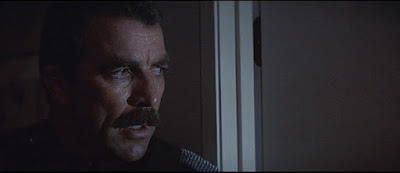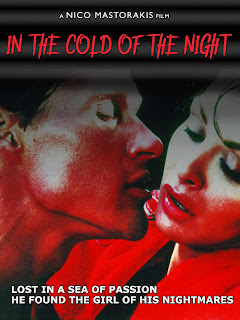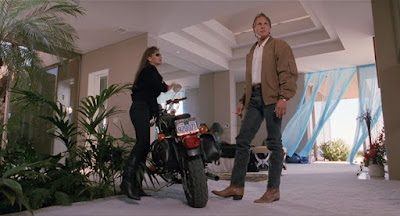This movie is not to be confused with the 1992 movie of the same title. It's the 1993 movie with Shannon Tweed that you need to look for.
The title is perhaps misleading. The heroine is not actually scorned in the sense that you might expect. She’s not rejected, but she is humiliated.
This is a genre hybrid. It’s a female revenge movie but it’s also a psycho female movie. The greatest of all psycho female movies is of course Pretty Poison (1968) and Tuesday Weld’s performance in that film will never be equalled. Having said that, Shannon Tweed has no reason to be ashamed of her performance in A Woman Scorned.
Truman Langley (Daniel McVicar) is a hard-driving hyper-ambitious business executive and is close to achieving his goal - he is about to be made a partner. He is a sleazy low-life creep who will do anything to advance his career, even to whoring out his wife Patricia (Shannon Tweed) in order to close a deal. Truman thinks this is OK because he’s a winner. He’s about to find out that he is actually a loser. He misses out on the partnership. The form brings in an outsider, Alex Weston (Andrew Stevens). And worse still, Truman is demoted. His career in ruins, he shoots himself.
Patricia is determined to get revenge. She wants revenge on Mason Wainwright (Stephen Young), the creep to whom her husband whored her out. No-one could blame her for waning revenge on Wainwright. He knew when he had sex with her that she had only agreed very reluctantly under extreme emotional blackmail from her husband.
But Patricia also wants revenge on Alex Weston. She blames Alex for beating out Truman for the partnership and thereby causing his death but in fact Alex had had no idea that he was inadvertently wrecking Truman’s career. Alex is basically a nice guy and a decent guy. He’s a family man. He would never have treated a woman the way Truman treated Patricia. Swearing revenge on Alex is crazy and wrong. And Patricia swears vengeance on Alex’s family as well, which is both crazy and evil.
So this is an intriguing twist on the female revenge movie. This is a woman who has picked the wrong targets for her revenge.
The truth is that Patricia, after her husband’s death, is no longer quite sane. One of the things I really love about this movie is that this is made wholly believable. Patricia has endured sexual humiliation engineered by her own husband. She has then had her husband blow his brains out. She is also facing financial ruin. Truman’s suicide voided his life insurance policy. All he has left Patricia are debts. But her emotions are very very conflicted. Despite everything, she loved her husband. Perhaps he had been a good man once and having fallen in love with him then she cannot stop loving him.
She is also conflicted about that sexual humiliation. Had she been raped she might have dealt with it. But she consented, which left her feeling like a whore.
She is dealing with so many confused and contradictory emotions that we can readily believable that her mind might well give way under the strain.
Andrew Stevens is fine as Alex, as is Kim Morgan Greene as Alex’s wife Marina.
But everything hinges on Shannon Tweed’s performance and she acquits herself extremely well. When she has to convey Patricia’s combination of horror, humiliation, disgust and self-disgust and when she has to get across Patrica’s tangled feelings towards her husband she does so effectively. When she embarks on her campaign of revenge Patricia is herself playing a part and Tweed makes sure we’re always aware that every emotion that Patricia displays is calculated.
We slowly come to realise that Patrica’s revenge plans are much more complicated, fiendish and devious than we expected.
Another thing I like is that whereas in most female revenge movies (including such excellent examples as Thriller: A Cruel Picture and Hannie Caulder) the woman has to learn to use a man’s weapons in this movie Patricia uses a woman’s weapons. This is to be a woman’s revenge.
The sex scenes all advance the plot and they all tell us something important about the characters. When Patricia seduces Robey she gets a great deal of pleasure out of it, but it’s clear that her physical pleasure comes from the psychological buzz of knowing that she in complete control and that she has him dancing to her tune. For the first ytime since her husband’s death Patricia is in control. It might even be the first time in her life she has experienced the pleasure of such total domination. In the scene in the poolroom the guy thinks he’s taking her violently but doesn’t realise that in fact she is the one taking him violently.
The impressive screenplay, by Karen Kelly and Barry Avrich, is packed with moral ambiguity and it has some nice twists. Patricia does evil but she is convinced that she is a righteous Avenging Angel. Having made that decision in her own mind she never questions it.
This is a much better and much cleverer movie than you might be expecting. In fact it compares quite favourably with major studio erotic thrillers of the 80s and 90s. Highly recommended.
I’ve only seen one of the other movies Miss Tweed did with Andrew Stevens, Illicit Dreams, a movie that has some fine moments and good ideas although the ending lets it down.
The title is perhaps misleading. The heroine is not actually scorned in the sense that you might expect. She’s not rejected, but she is humiliated.
This is a genre hybrid. It’s a female revenge movie but it’s also a psycho female movie. The greatest of all psycho female movies is of course Pretty Poison (1968) and Tuesday Weld’s performance in that film will never be equalled. Having said that, Shannon Tweed has no reason to be ashamed of her performance in A Woman Scorned.
Truman Langley (Daniel McVicar) is a hard-driving hyper-ambitious business executive and is close to achieving his goal - he is about to be made a partner. He is a sleazy low-life creep who will do anything to advance his career, even to whoring out his wife Patricia (Shannon Tweed) in order to close a deal. Truman thinks this is OK because he’s a winner. He’s about to find out that he is actually a loser. He misses out on the partnership. The form brings in an outsider, Alex Weston (Andrew Stevens). And worse still, Truman is demoted. His career in ruins, he shoots himself.
Patricia is determined to get revenge. She wants revenge on Mason Wainwright (Stephen Young), the creep to whom her husband whored her out. No-one could blame her for waning revenge on Wainwright. He knew when he had sex with her that she had only agreed very reluctantly under extreme emotional blackmail from her husband.
But Patricia also wants revenge on Alex Weston. She blames Alex for beating out Truman for the partnership and thereby causing his death but in fact Alex had had no idea that he was inadvertently wrecking Truman’s career. Alex is basically a nice guy and a decent guy. He’s a family man. He would never have treated a woman the way Truman treated Patricia. Swearing revenge on Alex is crazy and wrong. And Patricia swears vengeance on Alex’s family as well, which is both crazy and evil.
So this is an intriguing twist on the female revenge movie. This is a woman who has picked the wrong targets for her revenge.
The truth is that Patricia, after her husband’s death, is no longer quite sane. One of the things I really love about this movie is that this is made wholly believable. Patricia has endured sexual humiliation engineered by her own husband. She has then had her husband blow his brains out. She is also facing financial ruin. Truman’s suicide voided his life insurance policy. All he has left Patricia are debts. But her emotions are very very conflicted. Despite everything, she loved her husband. Perhaps he had been a good man once and having fallen in love with him then she cannot stop loving him.
She is also conflicted about that sexual humiliation. Had she been raped she might have dealt with it. But she consented, which left her feeling like a whore.
She is dealing with so many confused and contradictory emotions that we can readily believable that her mind might well give way under the strain.
Andrew Stevens is fine as Alex, as is Kim Morgan Greene as Alex’s wife Marina.
But everything hinges on Shannon Tweed’s performance and she acquits herself extremely well. When she has to convey Patricia’s combination of horror, humiliation, disgust and self-disgust and when she has to get across Patrica’s tangled feelings towards her husband she does so effectively. When she embarks on her campaign of revenge Patricia is herself playing a part and Tweed makes sure we’re always aware that every emotion that Patricia displays is calculated.
We slowly come to realise that Patrica’s revenge plans are much more complicated, fiendish and devious than we expected.
Another thing I like is that whereas in most female revenge movies (including such excellent examples as Thriller: A Cruel Picture and Hannie Caulder) the woman has to learn to use a man’s weapons in this movie Patricia uses a woman’s weapons. This is to be a woman’s revenge.
The sex scenes all advance the plot and they all tell us something important about the characters. When Patricia seduces Robey she gets a great deal of pleasure out of it, but it’s clear that her physical pleasure comes from the psychological buzz of knowing that she in complete control and that she has him dancing to her tune. For the first ytime since her husband’s death Patricia is in control. It might even be the first time in her life she has experienced the pleasure of such total domination. In the scene in the poolroom the guy thinks he’s taking her violently but doesn’t realise that in fact she is the one taking him violently.
The impressive screenplay, by Karen Kelly and Barry Avrich, is packed with moral ambiguity and it has some nice twists. Patricia does evil but she is convinced that she is a righteous Avenging Angel. Having made that decision in her own mind she never questions it.
This is a much better and much cleverer movie than you might be expecting. In fact it compares quite favourably with major studio erotic thrillers of the 80s and 90s. Highly recommended.
I’ve only seen one of the other movies Miss Tweed did with Andrew Stevens, Illicit Dreams, a movie that has some fine moments and good ideas although the ending lets it down.


































